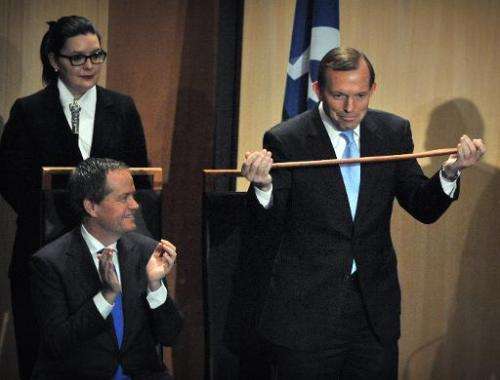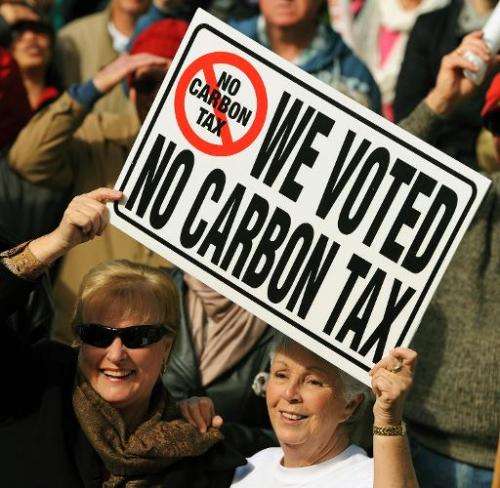Australian Opposition Leader Bill Shorten (L) congratulates Prime Minister Tony Abbott (R) on the receipt of an Aboriginal fighting boomerang at the opening of the 44th Parliament in Canberra on November 12, 2013
Australia's new conservative Prime Minister Tony Abbott Wednesday moved to abolish a carbon tax designed to combat climate change as his first major economic reform since taking office.
Abbott said the September 7 election which he won decisively had been a referendum on the future of the tax which was imposed by the former Labor government on major polluters from 2012 in a bid to reduce carbon emissions.
"No one should be in any doubt—the government is repealing the carbon tax in full," he said as he introduced a bill to repeal the tax into parliament.
"We are doing what we were elected to do. We have said what we mean and we will do what we say—the carbon tax goes. It goes."
Scrapping the divisive tax was a central election promise of Abbott who had argued the cost of the levy was passed on to consumers, resulting in higher utility bills and day-to-day costs.
"The intention of the new government is to put power prices down by axing this toxic tax and by using other means to reduce emissions," he said.
"This is our bill to reduce your bills, to reduce the bills of the people of Australia."
Protesters hold a placard during a no carbon tax rally in Sydney on July 1, 2012
Abbott also said the removal of the tax would strengthen the economy of Australia, which is among the world's worst per capita polluters due to its reliance on coal-fired power and mining exports.
The carbon tax had charged the country's biggest polluters for their emissions at a fixed price and was due to transition to an emissions trading scheme.
The new government instead favours a "direct action" plan that includes an incentive fund to pay companies to increase their energy efficiency, a controversial sequestration of carbon in soil scheme, and the planting 20 million trees.
Abbott had earlier been forced to wait for about an hour to move the legislation after Labor, which opposes the dismantling of the tax, stalled proceedings with debate about the government's nickname for opposition leader Bill Shorten.
The prime minister had referred to his opposition counterpart as "Electricity" Bill Shorten during a media interview earlier in the day, a moniker attacked by Labor as "name-calling".
Then as he began to move the bill, Abbott was interrupted by yelling protesters in the public gallery.
"Inaction (on climate) is simply not good enough," shouted one protester, one of more than a dozen removed from the chamber.
The government also introduced a bill to repeal the mining tax—a levy once proposed as a 40 percent tax on "super profits" within the industry but which was ultimately greatly reduced in size and scope after a backlash from the mining sector.
© 2013 AFP
























